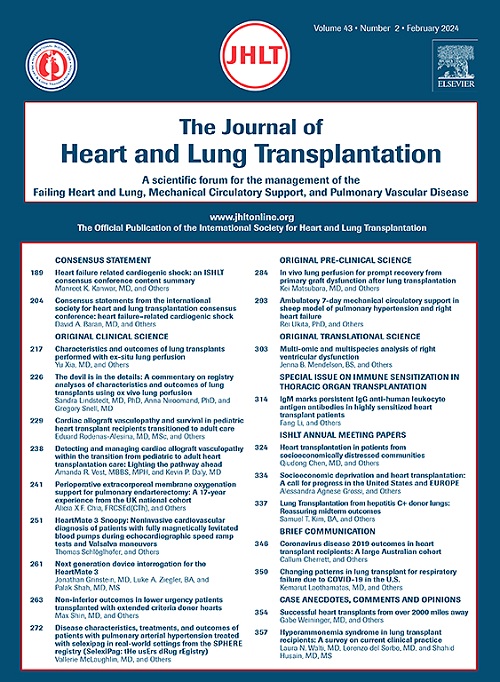Immunomodulatory soluble HLA-G and HLA-E are associated with rapidly deteriorating CLAD and HCMV viremia after lung transplantation
IF 6.4
1区 医学
Q1 CARDIAC & CARDIOVASCULAR SYSTEMS
引用次数: 0
Abstract
Plasma-soluble (s)HLA-G and sHLA-E are immunoregulatory proteins that balance the activation of NKG2A+ immune cells. In lung-transplant recipients (LTRs), dysregulated NKG2A+ natural killer cell responses may result in high-level human cytomegalovirus (HCMV) replication as well as chronic lung allograft dysfunction (CLAD), and especially the development of rapidly deteriorating CLAD is associated with high mortality. We thus analyzed the kinetics and function of sHLA-G and sHLA-E in follow-up samples of N = 76 LTRs to evaluate whether these immunoregulatory proteins are associated with the risk for CLAD and high-level HCMV replication. Here, we demonstrate that rapidly deteriorating CLAD LTRs are hallmarked by continually low (<107 ng/ml) sHLA-G levels. In contrast, high sHLA-E levels were associated with the following development of high-level (>1,000 copies/ml) HCMV episodes. Thus, sHLA-G and sHLA-E may serve as novel biomarkers for the development of rapidly deteriorating CLAD and high-level HCMV replication in LTRs.
免疫调节可溶性 HLA-G 和 HLA-E 与肺移植后迅速恶化的 CLAD 和 HCMV 病毒血症有关。
血浆可溶性(s)HLA-G 和 sHLA-E 是免疫调节蛋白,可平衡 NKG2A+ 免疫细胞的活化。在肺移植受者(LTR)中,NKG2A+ 自然杀伤细胞反应失调可能导致高水平的 HCMV 复制以及慢性肺移植功能障碍(CLAD),尤其是快速恶化的 CLAD 与高死亡率相关。因此,我们分析了 N=76 例 LTR 随访样本中 sHLA-G 和 sHLA-E 的动力学和功能,以评估这些免疫调节蛋白是否与 CLAD 和高水平 HCMV 复制的风险有关。在这里,我们证明了快速恶化的 CLAD LTR 的特征是持续的低水平(1000 拷贝/毫升)HCMV 发作。因此,sHLA-G 和 sHLA-E 可作为快速恶化的 CLAD 和高水平 HCMV 复制 LTR 的新型生物标志物。
本文章由计算机程序翻译,如有差异,请以英文原文为准。
求助全文
约1分钟内获得全文
求助全文
来源期刊
CiteScore
10.10
自引率
6.70%
发文量
1667
审稿时长
69 days
期刊介绍:
The Journal of Heart and Lung Transplantation, the official publication of the International Society for Heart and Lung Transplantation, brings readers essential scholarly and timely information in the field of cardio-pulmonary transplantation, mechanical and biological support of the failing heart, advanced lung disease (including pulmonary vascular disease) and cell replacement therapy. Importantly, the journal also serves as a medium of communication of pre-clinical sciences in all these rapidly expanding areas.

 求助内容:
求助内容: 应助结果提醒方式:
应助结果提醒方式:


